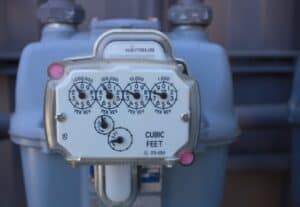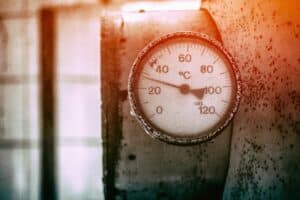Natural Gas Heat Is Cheaper Than Electric Heat In The US
[Update: Jan 2024 a reader pointed out we’re missing certain state values which has been corrected; we also updated the calculations with new data from EIA and news reports]
Unequivocally in the US, gas heat is cheaper on a per unit of heat basis. Several years ago when we did this analysis, natural gas was unequivocally the cheapest energy source for heating. Energy prices have fluctuated since then and after factoring in the efficiency of natural gas heating.

Now we find that for 2024, in all 50 states, natural gas heat continues to be cheaper than electric heat in every state. The only caveat is that we talk only about traditional electric heaters. Heat pumps are another story. Read on for our analysis below.
Natural Gas On Average Is Cheaper In The US By 60%
In our analysis below, we find that on average natural gas heat costs $19 per million BTU (MMBTU) compared to electric heat at $49 per MMBTU. That means natural gas heat costs about 40% of the price of electric heat over a year for a home. In fact, in the past year, natural gas prices have fallen!
| Natural gas ($ per MMBTU) | Electricity ($ per MMBTU) | |
| Cost per unit heat | $19.28 | $48.80 |
If you use natural gas heating and get a gas bill in the winter, it should in principle be less than the portion of the electric bill used for heating should you have used electric heating.
The reason for natural gas being cheaper is because natural gas furnaces pound for pound are more effective in generating heat energy. Maine’s heat pump program refers to a study that came up with similar figures. In their surveys annual costs for electric heat is $5,000 compared to annual costs for natural gas heat at $2,000.
Is Natural Gas Heating Cheaper Than Electric Heating In Your State?

Yes, it is true that natural gas heating will be cheaper than electric heating in every state. As we know, electric rates differ in every state. In fact, carbon intensity varies also because the source of electricity in every US state is different.
Table Of Comparison For Electric Heat vs Gas Heat Costs In Every State
[Updated: 01/04/2024] Here is the table of comparison for electric heat vs gas heat for every state.
| State | Gas Rate ($/MMBTU) | Electricity Rate ($/MMBTU) | Which is cheaper | Notes |
| USA Average | 16.7 | 47.45 | Gas | |
| Alabama | 25.88 | 43.64 | Gas | |
| Alaska | 11.38 | 70.6 | Gas | |
| Arizona | 25.71 | 42.58 | Gas | |
| Arkansas | 20.56 | 35.49 | Gas | |
| California | 17.83 | 86.2 | Gas | |
| Colorado | 11.96 | 42.82 | Gas | |
| Connecticut | 20.58 | 78.9 | Gas | |
| Delaware | 25.36 | 50.5 | Gas | |
| District of Columbia | 21.19 | 49.79 | Gas | |
| Florida | 29.23 | 45.08 | Gas | |
| Georgia | 27.76 | 38.63 | Gas | |
| Hawaii | 49.98 | 127.58 | Gas | |
| Idaho | 9.43 | 33.85 | Gas | |
| Illinois | 14.02 | 46.1 | Gas | |
| Indiana | 11.89 | 42.91 | Gas | |
| Iowa | 10.32 | 37.54 | Gas | |
| Kansas | 14.3 | 38.86 | Gas | |
| Kentucky | 16.78 | 38.48 | Gas | |
| Louisiana | 20.92 | 33.32 | Gas | |
| Maine | 19.2 | 80.36 | Gas | * |
| Maryland | 19.01 | 50.94 | Gas | |
| Massachusetts | 16.31 | 82.8 | Gas | |
| Michigan | 11.55 | 54.04 | Gas | |
| Minnesota | 15.75 | 42.17 | Gas | * |
| Mississippi | 20.53 | 40.01 | Gas | |
| Missouri | 24.92 | 35.73 | Gas | |
| Montana | 10.77 | 36.96 | Gas | |
| Nebraska | 18.48 | 33.29 | Gas | |
| Nevada | 24.63 | 50.15 | Gas | |
| New Hampshire | 27.18 | 75.73 | Gas | |
| New Jersey | 14.83 | 51.41 | Gas | |
| New Mexico | 16.27 | 42.56 | Gas | |
| New York | 20.21 | 66.59 | Gas | |
| North Carolina | 22.15 | 39.95 | Gas | |
| North Dakota | 13.63 | 31.48 | Gas | |
| Ohio | 19.77 | 46.13 | Gas | |
| Oklahoma | 29.22 | 35.4 | Gas | |
| Oregon | 16.37 | 37.95 | Gas | |
| Pennsylvania | 15.5 | 53.08 | Gas | |
| Rhode Island | 24.59 | 91.65 | Gas | |
| South Carolina | 19.47 | 41.35 | Gas | |
| South Dakota | 9.57 | 35.52 | Gas | |
| Tennessee | 18.31 | 37.16 | Gas | * |
| Texas | 24.5 | 42.82 | Gas | |
| Utah | 15.59 | 32.33 | Gas | |
| Vermont | 22.67 | 63.22 | Gas | |
| Virginia | 15.47 | 41 | Gas | |
| Washington | 16.91 | 32.47 | Gas | |
| West Virginia | 30.85 | 42.32 | Gas | * |
| Wisconsin | 9.84 | 49.09 | Gas | |
| Wyoming | 17.45 | 33.88 | Gas |
We Obtained Data From EIA To Perform State-By-State Comparison Of Costs
Above, we showed you figures from the EIA, the US Energy Information Administration. They perform testing and calculations and analyses. One of their data sources is natural gas costs and electric costs from suppliers in every state.
Many states don’t have monopolies of suppliers. There are multiple utilities that overlap and compete against each other. From this data, the EIA calculated averages for the cost of natural gas and electricity.
Remember, the differences show up at the municipal level! Your town may have negotiated rates as a group for you as a resident that differs from the rates that utilities post publicly.
The Costs Are In Dollars Per MMBTU – Millions Of British Thermal Units
The costs are computed in terms of BTU. A BTU, or a British Thermal Unit, is a way to measure energy. It’s the equivalent of the kilowatt hour, which you might know. There are approximately 3412 BTUs in 1 kWh. And either BTUs or kWh will be our way of measuring the heat needed for a home.
We don’t even need to know how much is needed for a home. We just need to know what is the cost for any single unit of BTU or kWh.
There is one more caveat. For electric heat, the amount of energy you put in is the amount of energy you get out because that’s the nature of technology behind electrical resistive heat.
For natural gas heat, conversion of the energy inside natural gas to heat energy is about 93% efficiency of higher, due to regulations in the US. However, we didn’t convert it below and kept it for clarity and leave it to you to do a conversion.
Natural Gas Heating Is Cheaper Than Electric Heating In All States
According to our analyses above, in all states the cost of natural gas heating is much cheaper than the cost of electric heating. In fact, natural gas is far cheaper than electric, by a factor of 2-3.
Even more strikingly, if you compare across states, in Hawaii the per MMBTU cost of electricity-based heating is a whopping $129, which is about 15 times more expensive than the cheapest natural gas heating at $8.25 in Idaho.
What to keep in mind? Well, both these states are not in the coldest part of the United States so the demand for heating is not as serious as say in the northeast or Great Lakes.
UK: Natural Gas Heating Is Still Cheaper Than Electric Heating – 2022
As an example of what is happening in Europe, before we talk about the US below, let’s take a look at the UK. Let’s compare natural gas to electricity.
The UK electricity rate is £0.34 per kWh (converted to $0.43 per kWh at Jun 2023 exchange rates), which is much higher than the average in the US at $0.164/kWh per kWh.
The price would be higher were it not for the cap imposed by the UK government due the extenuating circumstances of the Russo-Ukraine war.
On the flip side, UK natural gas cost is £134.54 per therm. People in the UK usually use mains gas for heating (estimated 90% of households) and the remainder (10% of households) are on electric.
When you convert the two to compare apples to apples, you get £99.65 / MMBTU for electricity, and £45.91 / MMBTU for natural gas. So again, natural gas ends up being much cheaper for heating, except it’s much much closer for the two energy sources than in the US. To complicate things, in the UK the government is subsidizing the cost of energy by capping payments.
| UK Mains Gas Heating Cost | UK Electricity Heating Cost |
| £45.91 / MMBTU | £99.65 / MMBTU |
We leave you with one final thought for the UK. Heat pumps deliver at minimum the equivalent of a ratio of 2 kWh of heating for every 1 kWh of electricity used.
This is the HSPF rating of the heat pump, and the real ratio is more like 2.5 to 3.5. Therefore, we expect in the UK if you ran a heat pump with the current electricity rates, you can reduce your heating costs down to £13 / MMBTU.
US Vs UK – US Gas Prices Are Much Lower
Why is there such a huge difference between the US and UK? The answer is hugely complicated because of the diversity of generation sources and the delivery solutions for electricity and natural gas in both countries.
For natural gas the difference is easier to understand because the US has an incredible abundance of natural gas from shale fracking.
It follows also, given that natural gas is the number one method of generating electricity as coal got phased out, that it would also be cheaper. The UK has access to oil through the North Sea region.
| Country | Electricity $/MMBTU | Gas $/MMBTU |
| UK | $57.93 | $125.74 |
| US | $48.92 | $15.37 |
Carbon Intensity Is A More Complicated Story
The carbon intensity of natural gas vs electric heating is a different story. It’s a complicated story. The carbon intensity of natural gas is well known. It’s 53 g CO2 emitted per MMBTU.
ou can measure this by burning natural gas, measuring the amount of heat that comes off, and calculate the theoretical grams of carbon dioxide emitted from the combustion. You might even be able to measure the CO2 directly.
Electricity Is Sourced From Different Fuels – The Carbon Intensity Is Different For Every State, Every Utility
The carbon intensity of the electrical grid is more complicated. This is because the energy sources that go into the grid are diverse.
A single electricity provider has the option of sourcing energy from coal, oil, natural gas, hydro, wind, and nuclear power. It may generate only a fraction of that power itself and transfer the remainder from another provider.
Finally, people generate their own power through home solar panels. For example if you know you’re using solar which we mention above, you know your carbon intensity is near zero.
But what if you’re asking about on average for people using the electric grid? The estimated carbon intensity of electricity is 883 lbs CO2 per megawatt hour, which translates to 400 kg CO2 per megawatt hour.
Which Is Cheaper Depends On The Cost of Electricity And Natural Gas Prices
We presented an analysis for the numbers we’ve found in both the UK, and across the 50 states of the US. However, for your particular region of the world it may be different.
To carry out this comparison for yourself, the key numbers you need are the electricity cost per kWh (kilowatt hour which is equivalent to 3412 BTU) and the natural gas cost per cubic foot (1 cubic foot is 0.14 kWh).
With these numbers, it becomes almost possible to compare apples to apples if you convert both to the same units, for example we always use the amount of money (dollars) per unit of heat (kWh).
The last piece of information you need is the efficiency of your heating appliance. We assume 100% efficiency for electricity and 93% for natural gas heating. Finally, if you live in Europe, then you are experiencing more complicated costs.
Heat Pumps Are Not Covered In This Article
In fact, as we mentioned above, heat pumps are very efficient and will beat natural gas. Heat pumps are able to move more BTUs of heat energy for a given amount of electricity than an electrical heater can generate.
Heat pumps are even more efficient than natural gas cost-wise, unless electricity costs rise really high. For the same costs that the US is experiencing 2022, heat pumps move more heat into the home than natural gas furnaces generate.
In This Article – Electric Heat Means Traditional Resistive Heaters
For this article we mean only electric resistive heat costs referring to classic, standard baseboard heating. The electricity is used to directly create heating which radiates out of the heating system.
Modern heat pumps are also driven by electricity but instead of generating it directly, heat pumps move heat from one location to another. So heat pump efficiencies would be calculated in a different way and aren’t considered here.
Our Data Is From Late 2022 and 2023
Energy costs have increased across the board due to global events. We are using residential electricity prices from Sep 2023, and natural gas prices from Sep 2023. This is pretty updated, but of course, with a lag of a few months. The source of data is the EIA (the US Energy Information Administration) which computes “true costs” that includes both variable and fixed costs, including capacity charges, delivery charges, taxes etc.
Note that people who use home generated solar energy will pay almost nothing except for the upfront investment in the solar panels, which is considerable and should be part of the accounting.
We also show that in the UK, natural gas heat is slightly cheaper than electric heat. The numbers work out differently because the cost of energy is very different.

Anne Lauer
Anna Lauer is a writer, gardener, and homesteader living in rural Wisconsin. She has written for Mother Earth News, Grit, and Hobby Farms magazines. Anna is writing a new book about growing your food for free and an ultimate guide to producing food at little to no cost. When she’s not writing or gardening, Anna enjoys spending time with her husband and two young daughters.
